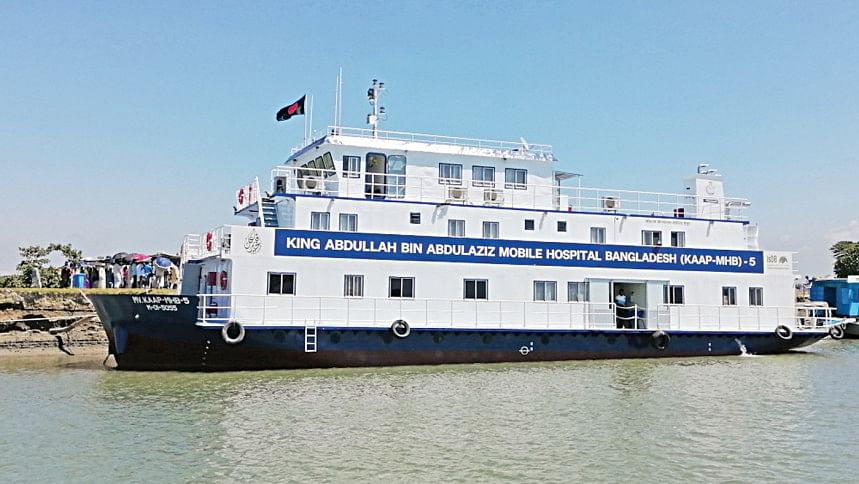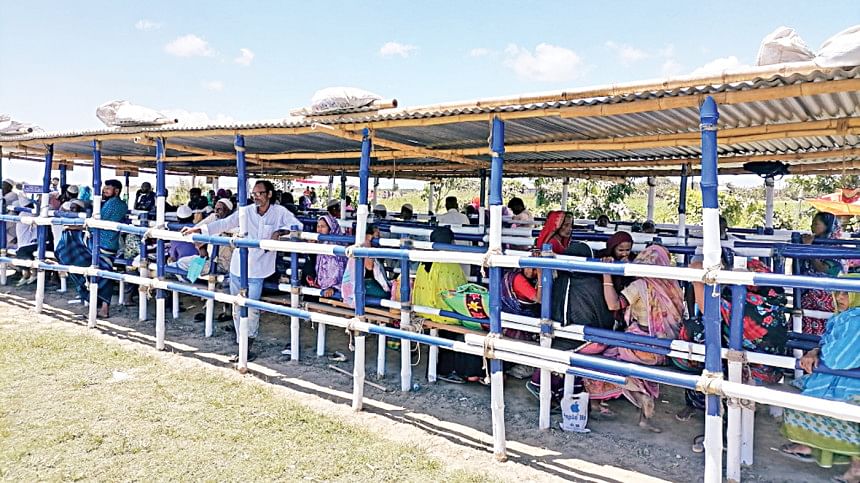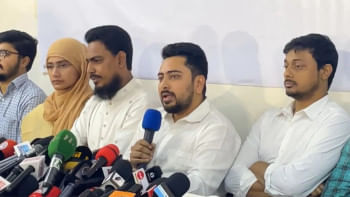Lifesaver on the Meghna: Floating hospital brings hope to char people in Chandpur

Sixty-five-year-old Zamir Ali Majhi had long suffered from an eye condition but could not afford the treatment he needed.
When doctors at a hospital in Dhaka recommended cataract surgery for both eyes -- each costing Tk 10,000 -- he had no choice but to return home to Malikandi, a remote char in Chandpur's Haimchar upazila on the bank of the Meghna river.
Later, he heard about a floating hospital stationed near a nearby village that provides free medical services.
"I came to the hospital where they checked my eyes and told me to return today for the operation on one eye. I'm now waiting for the procedure," Zamir said at the floating hospital on Wednesday.
He was among over 100 patients who received free eye surgery during a two-day eye camp held on Tuesday and Wednesday at the King Abdullah bin Abdulaziz Mobile Hospital Bangladesh, stationed in the Sikdertek area under Nilkamal Union.
The floating hospital, which began regular healthcare services in early January with periodic health camps, was formally inaugurated on Wednesday by Saidur Rahman, secretary of the Health Services Division.

Eighteen medical staff, including three doctors, provide services there.
This is the fifth and largest ship hospital operating under the "Medical Mobile Units for Healthcare in Rural Areas in Bangladesh" project, aimed at delivering healthcare to remote and riverine communities.
Funded by the King Abdullah Foundation through the King Abdullah bin Abdulaziz Programme for Charity Works (KAAP) of the Islamic Development Bank, the project is implemented by Friendship, a Bangladeshi NGO, in collaboration with the Directorate General of Health Services.
Under the project, five floating hospitals offer comprehensive medical and diagnostic facilities, including eye and dental care, minor surgeries, maternal and child healthcare, and treatment of communicable and non-communicable diseases.
The initiative targets around 3.27 million people in 13 upazilas across 12 districts in southern coastal, north-western, and north-eastern riverine regions of Bangladesh.
HOW CHAR PEOPLE ARE BENEFITTING
Sufia Begum, 35, came from Mollahkandi, a neighbouring village of Sikdertek, with a dental problem.
"I got relief after receiving treatment at the hospital in January. I came today for a follow-up. This hospital provides us with excellent service," she said.
She spent Tk 10 to cross the Meghna channel to reach the hospital. "But I would have to spend the entire day and a lot more money if I had to go to a hospital in Haimchar or Chandpur town."
Jahanara Begum, 48, also from the same village, said, "If someone falls sick, we have no option but to go to local drug stores seeking medicine."
Ratan Chowkidar, a member of Nilkamal Union and resident of Majhikandi, said it takes over an hour by trawler to reach the Haimchar Upazila Health Complex.
"But a doctor is not always available there, often forcing people to travel to Chandpur, spending more money and time," he said. "So, the floating hospital is a huge benefit for us."
A Friendship official said around 150 to 170 patients receive treatment daily. Periodic camps are held focusing on specialised care such as eye, ENT, burn and plastic surgery, and gynaecology. Medicines are provided free of cost.
The mobile unit stays anchored at a location for about two and a half months before moving to the next.
With the hospital scheduled to leave in a few days, locals are calling for it to be made permanent.
"This hospital is providing an invaluable service, and we want it to continue," said Ratan.

 For all latest news, follow The Daily Star's Google News channel.
For all latest news, follow The Daily Star's Google News channel. 



Comments